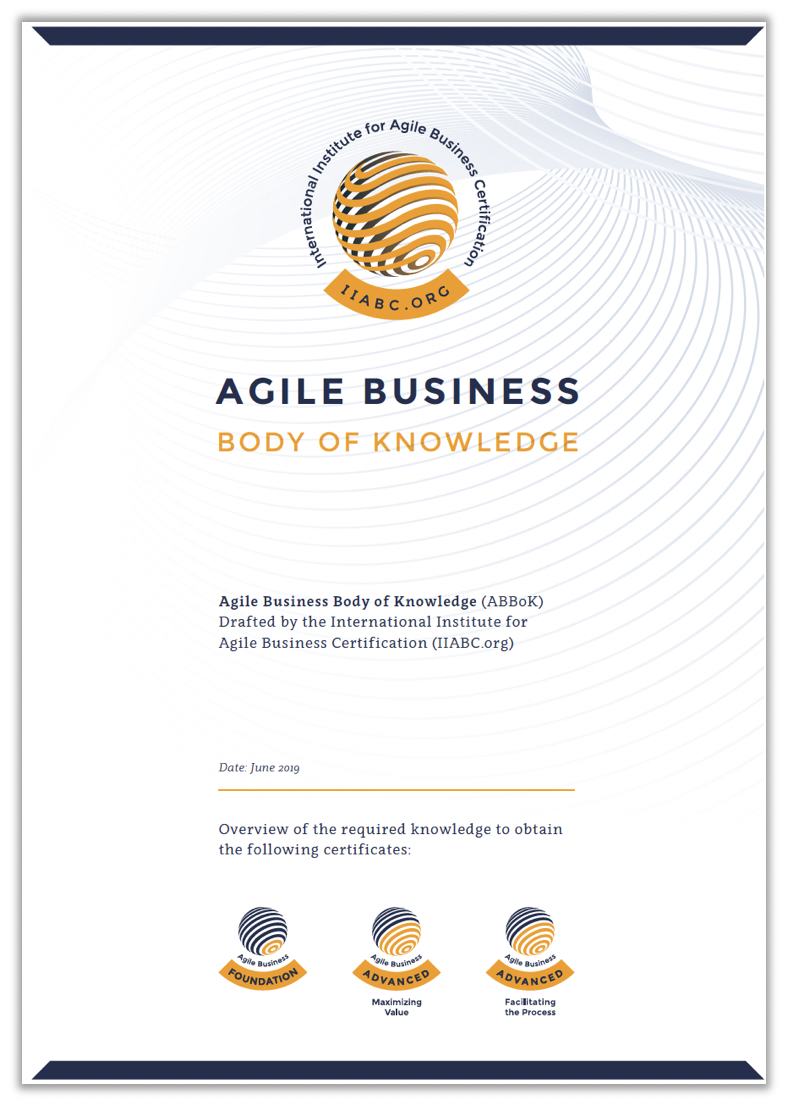1. Course material for Foundation and Advanced certificates
For the Agile Business Expert – Agile Coach certificate you have to study additional resources. Scroll down for more information.
Study the Agile Business Body of Knowledge thoroughly for the following certificates:
- Agile Business Foundation
- Agile Business Advanced – Facilitating the Process
- Agile Business Advanced – Maximizing Value
The Agile Business Body of Knowledge was drafted by the International Institute for Agile Business Certification (IIABC.org). This Body of Knowledge is unique in the following:
- IIABC.org is focused on the use of Agile within the whole of the organization
- While other certification bodies in their Body of Knowledge focus on a specific framework, the IIABC gives an overview of (i) Agile as a whole and (ii) specifically Scrum and Kanban. Through this focus you will be able to gain an overview of the use of Agile within the complete organization because:
- Knowledge of the Agile values and principles gives a general direction which is the basis of the creation of an Agile mindset;
- Knowledge of Scrum and Kanban gives the insights needed to structure both project based and operational work.
The theories described in this Body of Knowledge where for the most part developed by key figures in the Agile movement. IIABC does not claim to be the original source. On the other hand, the way the theory is presented, a combination of Agile, Scrum and Kanban, is unique, and you as a reader will benefit from it.
2. Additional course material for the Agile Business Expert certificate
For this certificate the Agile Business Body of Knowledge is also mandatory. In addition, you can expect questions about the following literature.
- Wiseman, L., & McKeown, G. (2010). Bringing out the best in your people. Harvard Business Review, 88(5), 117-21. (download)
- Dweck, C. S. (2009). Mindsets: Developing talent through a growth mindset. Olympic Coach, 21(1), 4-7. (download)
- Cappelli, P., & Tavis, A. (2018). HR goes agile. Harvard Business Review, 96(2), 46-52. (download yourself)
- De Meuse, K. P., Dai, G., & Hallenbeck, G. S. (2010). Learning agility: A construct whose time has come. Consulting Psychology Journal: Practice and Research, 62(2), 119. (download)
- Lencioni, P. (2006). The five dysfunctions of a team. John Wiley & Sons. (download)
- Brosseau, D., Ebrahim, S., Handscomb, C., and Thaker, S. (2019). The journey to an agile organization. McKinsey & Company. (download)
- Cavanagh, M. J., & Grant, A. M. (2010). The solution-focused approach to coaching. The complete handbook of coaching, 54-67. (download)
- Agile Business Body of Knowledge
